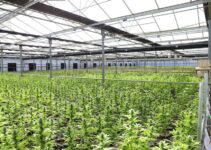I'm diving into the complex world of hemp-derived THC farming. Navigating the legalities can be tricky, but understanding the laws, licensing requirements, zoning regulations, and compliance standards is essential. From environmental regulations to quality control standards, there's a lot to consider when venturing into this industry. Join me as I explore the ins and outs of Delta 8 THC farming and the legal considerations that come with it.
Key Takeaways
- Compliance with legal limits on Delta 8 THC potency is crucial for hemp-derived THC farming.
- Understanding and adhering to industry standards for extraction methods is essential.
- Navigating zoning and land use regulations is necessary to ensure proper cultivation restrictions.
- Adhering to environmental regulations for soil and water quality is important for sustainable and responsible farming practices.
Understanding Delta 8 THC Farming Laws
How can I legally cultivate Delta 8 THC within the framework of hemp-derived THC farming laws? Understanding the legal landscape is crucial in navigating the cultivation of Delta 8 THC. Delta 8 potency, extraction methods, market demand, legal challenges, regulatory compliance, and consumer safety are all key factors to consider. The potency of Delta 8 THC must comply with legal limits, and extraction methods should adhere to industry standards and regulations to ensure the safety and purity of the product. Additionally, understanding market demand and legal challenges is essential for a successful and compliant operation. Regulatory compliance is paramount, as the industry is subject to evolving laws and regulations. Prioritizing consumer safety through adherence to quality standards and testing protocols is not just good practice but also a legal requirement in this burgeoning industry.
Licensing Requirements for Hemp-Derived THC Farming
Navigating the licensing requirements for hemp-derived THC farming involves understanding the specific regulations and permits needed to legally cultivate Delta 8 THC within the framework of existing laws. Hemp cultivation licensing and compliance are essential components of this process. Regulatory hurdles can include demonstrating compliance with THC content limits, adhering to testing and reporting requirements, and obtaining the necessary permits from local, state, and federal authorities. The licensing process typically involves submitting detailed applications, providing documentation of farming practices, and ensuring that the cultivation process meets all legal standards. It's crucial to stay informed about any updates or changes in hemp-derived THC farming laws to maintain compliance and avoid potential legal issues. Engaging with legal professionals who specialize in cannabis law can also help navigate the complexities of licensing for hemp-derived THC farming.
Zoning and Land Use Regulations for Delta 8 Hemp Farming
When it comes to delta 8 hemp farming, understanding zoning laws and land use regulations is crucial. These regulations dictate where and how hemp cultivation can take place, affecting everything from farm location to the size of the operation. It's important to be aware of the specific restrictions that apply to delta 8 cultivation to ensure compliance with local laws and ordinances.
Zoning Laws for Farming
As a hemp farmer, I navigate zoning laws to ensure compliance with land use regulations for Delta 8 hemp farming. Zoning laws play a crucial role in determining where and how agricultural practices, such as hemp farming, can take place. Here are some key considerations when navigating zoning laws for farming:
- Zoning Classifications: Understanding the specific zoning classifications that permit hemp farming is essential.
- Buffer Zones: Being aware of buffer zone requirements, especially in relation to residential areas, is crucial for compliance.
- Environmental Impact Assessments: Some zoning laws may require environmental impact assessments for hemp farming operations.
- Permitting Processes: Familiarizing myself with the permitting processes for hemp farming within different zoning areas is essential for ensuring legal compliance.
Navigating zoning laws for farming can be complex, but it is vital for operating a Delta 8 hemp farm within the boundaries of the law.
Land Use Regulations
I ensure compliance with zoning laws and land use regulations as a Delta 8 hemp farmer, which involves understanding specific zoning classifications and buffer zone requirements, as well as navigating permitting processes within different zoning areas. Agricultural exemptions are crucial considerations when determining the permissibility of Delta 8 hemp farming activities within designated zones. It's important to be well-versed in the regulations that govern agricultural exemptions, as they can impact where and how Delta 8 hemp can be cultivated. Additionally, conservation easements play a significant role in land use regulations for Delta 8 hemp farming. Understanding the limitations and requirements associated with conservation easements is essential for ensuring compliance and sustainable practices on the land used for Delta 8 hemp cultivation. By staying informed about these regulations, I can effectively navigate the complexities of land use regulations and ensure responsible Delta 8 hemp farming practices.
Delta 8 Cultivation Restrictions
Navigating Delta 8 cultivation restrictions requires understanding the specific zoning classifications, buffer zone requirements, and permitting processes within different zoning areas. When it comes to zoning and land use regulations for Delta 8 hemp farming, several key factors need to be considered:
- Zoning Classifications: Different areas may have specific zoning designations for hemp cultivation, and understanding these classifications is crucial for compliance.
- Buffer Zone Requirements: Regulations often dictate the distance that Delta 8 hemp farms need to be from residential areas, schools, and other sensitive locations.
- Permitting Processes: Each zoning area may have its own permitting requirements and processes for Delta 8 cultivation, which must be navigated accordingly.
- Delta 8 Product Demand and Market Competition: Understanding the market demand for Delta 8 products and the competitive landscape can help inform decisions regarding cultivation locations and strategies.
Compliance With State and Federal Hemp Cultivation Laws
While navigating the legalities of hemp-derived THC farming, it is essential to ensure compliance with both state and federal hemp cultivation laws. Compliance challenges can arise due to the complex and evolving nature of these regulations. State and federal authorities may impose enforcement measures, such as audits and inspections, to ensure adherence to the laws. To mitigate legal liabilities, risk management strategies should be implemented, including thorough record-keeping and staying informed about any changes in regulations. Understanding the specific requirements of each jurisdiction is crucial for maintaining compliance. Failure to comply with these laws can result in severe consequences, including fines and suspension of cultivation activities. Therefore, it is imperative for hemp-derived THC farmers to stay vigilant and proactive in their efforts to comply with state and federal hemp cultivation laws.
Environmental Regulations for Delta 8 THC Farming Operations
As a hemp farmer, ensuring soil and water quality is crucial to me. Proper waste disposal methods and responsible pesticide and herbicide use are also top priorities. These environmental regulations for Delta 8 THC farming operations are essential to maintain a sustainable and eco-friendly approach to hemp cultivation.
Soil and Water Quality
When farming Delta 8 THC, it's essential to adhere to strict environmental regulations for soil and water quality. Environmental impact and sustainability practices play a crucial role in ensuring the responsible cultivation of hemp-derived THC. To maintain soil and water quality, farmers must:
- Implement crop rotation techniques to prevent soil depletion and erosion.
- Utilize organic fertilizers and natural pesticides to minimize water contamination.
- Regularly test soil and water for THC levels to prevent environmental impact.
- Employ water conservation methods such as drip irrigation to promote sustainable practices.
Waste Disposal Methods
To ensure compliance with environmental regulations for Delta 8 THC farming operations, I prioritize proper waste disposal methods, which are essential for minimizing the impact on soil and water quality. Implementing sustainable practices is crucial, and one way to achieve this is by using biodegradable waste disposal methods. By utilizing biodegradable materials, we can reduce the environmental impact of waste generated during farming operations. This approach aligns with sustainable practices and helps to preserve the surrounding ecosystem. Below is a table outlining some effective waste disposal methods for Delta 8 THC farming operations:
| Waste Disposal Methods | Description | Benefits |
|---|---|---|
| Composting | Decomposition of organic waste for soil enrichment | Soil enrichment, reduced landfill use |
| Mulching | Covering soil with organic matter to retain moisture | Soil moisture retention, weed control |
| Recycling | Reprocessing waste materials for future use | Conservation of resources, waste reduction |
Pesticide and Herbicide Use
Having addressed waste disposal methods to meet environmental regulations for Delta 8 THC farming, I now turn to the critical aspect of pesticide and herbicide use in our farming operations. When it comes to pesticide and herbicide use, we prioritize sustainable agriculture and crop protection through the implementation of integrated pest management practices. This approach focuses on natural predators, crop rotation, and targeted pesticide use to minimize environmental impact. Additionally, we are committed to obtaining organic certification for our farming operations, ensuring that any pest and weed control products used are in line with organic standards. By adhering to these principles, we aim to cultivate hemp-derived THC in a responsible and environmentally conscious manner.
- Integrated pest management
- Sustainable agriculture
- Organic certification
- Crop protection
Testing and Quality Control Standards for Hemp-Derived THC
As a hemp-derived THC farmer, I prioritize implementing rigorous testing and quality control standards to ensure compliance and product safety. Quality assurance is paramount in the hemp industry, and regulatory compliance is non-negotiable. By adhering to industry standards, I can guarantee the safety and purity of my hemp-derived THC products. Regular testing for potency, contaminants, and residual solvents is essential to maintain consistent quality and meet legal requirements. This commitment to product safety not only builds consumer trust but also ensures alignment with state and federal regulations. These measures are crucial in upholding the integrity of the hemp-derived THC industry and safeguarding public health. Now, let's delve into the intricate web of transportation and distribution regulations for delta 8 products.
Transportation and Distribution Regulations for Delta 8 Products
Navigating the intricacies of transportation and distribution regulations for delta 8 products is crucial for ensuring compliance and maintaining product safety and integrity in the hemp-derived THC industry. When it comes to transporting and distributing delta 8 products, several key factors must be considered:
- Product labeling: Ensuring that all delta 8 products are accurately labeled in compliance with state and federal regulations is essential for transparency and consumer safety.
- Interstate commerce: Understanding the specific laws and regulations governing the transportation of delta 8 products across state lines is critical for avoiding legal issues and ensuring compliant distribution practices.
- Packaging requirements: Adhering to packaging guidelines, including child-resistant packaging and tamper-evident seals, is vital for maintaining product safety during transportation and distribution.
- Record-keeping: Establishing robust record-keeping processes to track the transportation and distribution of delta 8 products is essential for regulatory compliance and accountability.
Legal Considerations for Marketing Hemp-Derived THC
When marketing hemp-derived THC, my primary focus is on understanding and complying with the legal considerations to ensure transparency and consumer safety. Adhering to marketing regulations is crucial to maintain compliance and build trust with consumers. Consumer education plays a pivotal role in conveying the benefits and potential risks associated with hemp-derived THC products. By providing accurate and comprehensive information, we can empower consumers to make informed decisions. Ensuring that marketing materials are clear, accurate, and free from deceptive claims is essential. Below is a table summarizing key legal considerations for marketing hemp-derived THC:
| Legal Considerations | Description |
|---|---|
| Adhering to Regulations | Complying with state and federal marketing regulations. |
| Consumer Education | Providing comprehensive information for informed decisions. |
| Transparency | Ensuring clarity and accuracy in marketing materials. |
| Avoiding Deceptive Claims | Preventing misleading or false assertions about the product. |
| Product Safety | Upholding consumer safety and well-being through marketing. |
Frequently Asked Questions
Can I Legally Sell Hemp-Derived THC Products Across State Lines?
Yes, legally selling hemp-derived THC products across state lines is subject to selling restrictions and interstate commerce laws. It's important to understand and comply with these regulations to conduct business in multiple states.
What Are the Legal Implications of Using Hemp-Derived THC in Food and Beverages?
Using hemp-derived THC in food and beverages requires regulatory compliance to ensure consumer safety. It's essential to understand the legal implications and follow guidelines for production, labeling, and distribution to avoid potential legal issues.
Are There Specific Regulations for the Extraction and Processing of Delta 8 THC From Hemp?
Specific regulations govern extraction of delta 8 THC from hemp. Extraction methods must comply with regulatory requirements to ensure legality. Understanding and adhering to these rules are crucial for operating within the legal framework.
What Are the Legal Considerations for Exporting Hemp-Derived THC Products Internationally?
When exporting hemp-derived THC products internationally, it's crucial to understand international regulations, import restrictions, market demand, product labeling, and quality control. I always ensure compliance with these aspects for successful international trade.
How Do Federal and State Laws Differ When It Comes to Advertising and Promoting Hemp-Derived THC Products?
Advertising regulations for hemp-derived THC products vary between federal and state laws. Promotional restrictions also differ, making it essential to understand both levels of legislation. Navigating this legal landscape requires careful attention to detail and compliance with all relevant guidelines.
Conclusion
Navigating the legalities of hemp-derived THC farming requires careful attention to state and federal laws, licensing requirements, zoning regulations, and environmental standards. It's important to ensure compliance with testing and quality control standards, as well as transportation and distribution regulations. With the right legal considerations and understanding of the laws, farmers can successfully navigate the complex landscape of hemp-derived THC farming.





